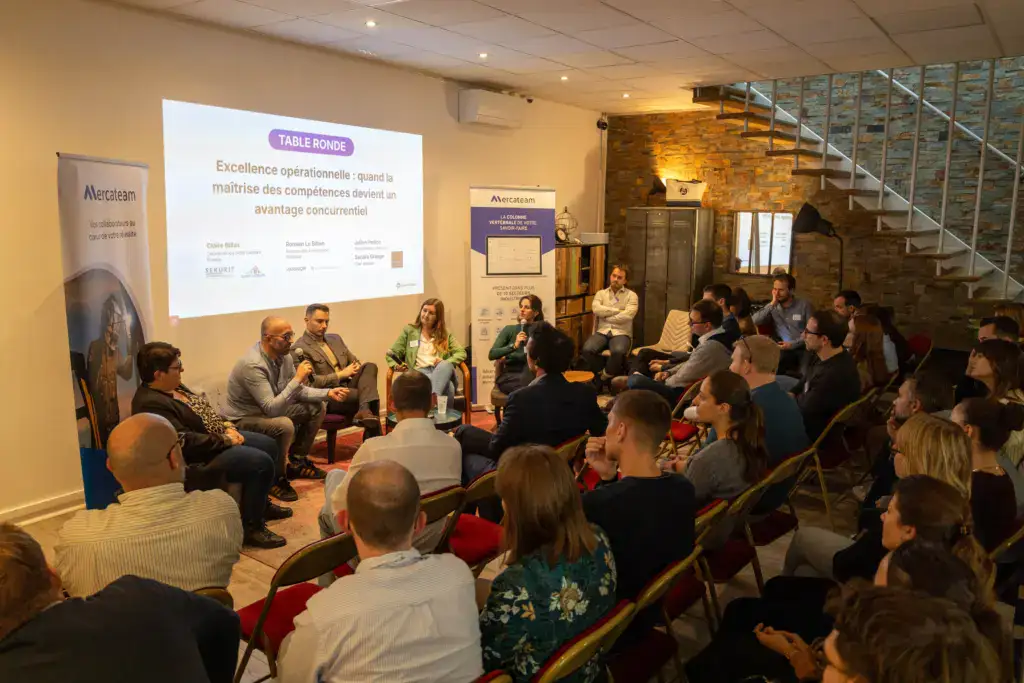1. Understanding special processes in industry
Not all manufacturing processes are created equal. And some are particularly sensitive: such is the case with special processes.
The special feature? It's impossible to check the quality of the final product without destroying it. In other words, a defect can go undetected... until the product is used, sometimes years later. It's a real challenge in terms of quality, safety and compliance.
So how do you do it? How do you guarantee reliable results, maintain the skill level of your teams and prove your compliance during audits ? These are the questions that managers ask themselves every day. production and quality managers to meet ever more stringent requirements.
In-depth definition of a special process
A special process is defined as a production process whose outputs cannot be verified by monitoring or measurement after the fact. Unlike standard processes where quality control can confirm product conformity, special processes do not allow such verification without damaging or destroying the product itself.
This characteristic implies a different approach: rather than checking the result, the process itself must be validated and monitored to ensure that every parameter is under control. Product quality therefore depends entirely on the rigor applied during the manufacturing process.
The different types of special processes
Special processes are found in many industrial sectors and take many different forms:
- WeldingThe melting of materials creates bonds whose internal properties cannot be fully verified by non-destructive testing. Mechanical characteristics, resistance to various stress modes, and dynamic behavior are difficult to assess without destructive testing.
- BrazingThis assembly process, used in particular in aeronauticsThis requires perfect control of temperatures and application times to guarantee a reliable bond.
- CollageHow can you be sure that two parts are perfectly bonded in depth? The quality of the adhesive bond and its mechanical strength or watertightness cannot be fully verified without testing to failure.
- Heat treatmentThese processes modify the internal properties of materials, but full verification of structural changes would require destructive testing.
- Surface treatmentsAnodizing, chromium plating, industrial painting... These processes modify the surface characteristics of parts, with implications for their durability and resistance.
- Sterilization: In the medical sector, the effectiveness of a sterilization process cannot be verified on every product without compromising its sterility.
Issues specific to each type of process
Each special process presents its own challenges. In the case of welding, the central question is: how can we ensure that the weld properties meet the specifications? Parameters such as current intensity, feed speed or welder qualification have a direct influence on the result.
When it comes to bonding, the main issue is to be sure that the two parts being joined will provide the correct mechanical strength or seal over time. Surface preparation, drying time and application environment are critical factors.
In the case of heat treatment, the challenge is to ensure that the entire part conforms to the required specifications, with homogeneous properties obtained throughout the volume.
Industrial paint, particularly in the aerospace and military sectors, must meet precise requirements in terms of adhesion and resistance to aggressive environments. Surface preparation and product application follow rigorous protocols that determine the durability of the treatment.
2. Qualification and validation of special processes
The steps involved in qualifying a special process
Qualification of a special process generally follows a methodology structured in several phases:
- Definition of technical requirementsThe aim is to establish precisely the parameters of the application and the characteristics expected of the parts.
- Installation Qualification (IQ)This step involves checking that the equipment is correctly installed, calibrated and capable of operating to specification.
- Operational Qualification (OQ)This confirms that the process is operating consistently within the set limits.
- Performance Qualification (PQ)This phase demonstrates that the process consistently produces results in line with predefined specifications.
- Controlling incoming materialsControlling the raw materials and consumables used in the process is essential.
- Description of instructions and proceduresDetailed documentation of process implementation guarantees reproducibility.
- Maintenance of production equipmentRegular maintenance of equipment, including control and measurement equipment, ensures process stability over time.
Any modification to a special process must be systematically re-qualified to ensure that the changes do not affect product quality.
Staff training and accreditation
Operators play a central role in the implementation of special processes. Their training and the validation of their skills are decisive factors in the success of the process.
Training must be structured, documented and validated by qualified personnel. It generally combines
- Theoretical training on fundamental principles
- Supervised hands-on training
- An assessment of acquired skills
- Periodic refresher courses to maintain expertise levels
The resulting authorizations are often time-limited and require renewal. Keeping track of them represents a logistical challenge for HR departments and production managers, especially as the consequences of expired authorizations can be serious: non-conformities during audits, quality problems, even production stoppages. Visit training management software are necessary for healthy production.
Sector-specific standards and certifications
Special processes are generally governed by strict standards that vary from one sector to another:
- Aeronautical sector: The EN 9100 standards include specific requirements for special processes, complemented by standards such as Nadcap (National Aerospace and Defense Contractors Accreditation Program).
- Automotive sectorIATF 16949 provides a framework for special processes in the automotive industry, with specific requirements for validation and monitoring.
- Medical industryISO 13485 standards require rigorous validation of special processes such as sterilization.
There are also specific certifications for certain processes:
- For welding: EN 15085-2, EN 1090-1, ISO 3834
- For paint: FROSIO
- For brazing: ESSA/IWE
These certifications require audits The auditors devote a considerable amount of time to special processes, in proportion to their number and complexity. The time spent by auditors on special processes is proportional to their number and complexity, making them an important part of the certification audit.
The consequences of an unvalidated special process can be serious, ranging from critical non-compliance to suspension of marketing authorization, and costly process modifications.
👉 WANT TO SEE HOW MERCATEAM CAN FIT INTO YOUR FACTORY?
3. The day-to-day challenges of special process management
Skills tracking and tracing
For a production manager or quality manager, the day-to-day management of special processes represents a real organizational challenge. Traceability is at the heart of this issue: you need to be able to demonstrateWe can always confirm that each process has been carried out by qualified personnel, using validated equipment and within controlled parameters.
This traceability implies keeping detailed records to document the process:
- The identity of the operators who carried out the process
- Dates and times of execution
- Applied parameters
- Checks carried out
- Any discrepancies noted and corrective actions taken
Traditionally managed on paper or with Excel files, this documentation quickly becomes voluminous and complex to maintain. Searching for information during an audit or to analyze customer feedback can become a headache, consuming precious resources for hours on end.
Keeping track of operators' skills is another crucial aspect. When a site has dozens of operators and a multitude of special processes, keeping track of training, authorizations and refresher courses becomes an exercise in administrative acrobatics, particularly when the information is scattered across different systems or files.
Authorization management and renewal
Visit authorizations related to special processes generally have a limited validity period - often between 12 and 18 months. Their renewal requires:
- Identify expiring authorizations
- Plan refresher courses
- Organizing assessments
- Update clearance documents
- Ensure that operators maintain their skills between two refresher courses
Without an effective warning system, the risk of forgetting to renew a clearance is real. The consequences can be far-reaching: non-conformities during audits, questioning of production validity, or even shutdown of certain production lines while waiting for personnel to be re-qualified.
In demanding sectors such as aeronautics, this management becomes critical, as customers themselves may demand verification of operator authorizations during unannounced audits or quality reviews.
Impact on audits and regulatory compliance
Special processes play a major role in certification audits. The time spent by auditors on these processes is often proportional to their number and complexity. An ill-prepared audit in this area can lead to major non-conformities and jeopardize business-critical certifications.
To prepare for an audit, you need to be able to present..:
- Process qualification files
- Proof of staff training and clearance
- Equipment maintenance records
- Process validation controls
- Corrective actions taken following previous audits
Without rigorous organization and appropriate tools, this preparation can easily take up several weeks of work and involve several people. The challenge, therefore, is to have a system that provides rapid access to relevant information and demonstrates mastery of processes.
4. Digitizing the management of special processes
The limits of traditional methods (Excel, paper)
If your company, like many others, still manages its special processes via Excel files or paper documents, you're probably familiar with these situations:
- Excel files that become too complex over time
- Scattered and sometimes contradictory information
- Tedious, error-prone updates
- Considerable time spent searching for information
- Difficulties in obtaining an up-to-date overview of the situation
These traditional methods have several major drawbacks:
- The risk of human error during data entry
- No automatic alerts for deadlines
- The difficulty of sharing information between different players
- Time wasted handling multiple documents
- The complexity of generating reliable reports and statistics
A quality manager in the aeronautics industry recently testified that preparing for a customer audit used to require several days of gathering and organizing documents relating to special processes, mobilizing several people and generating considerable stress.
The benefits of a digital solution for monitoring special processes
In the face of these constraints, digitizing the management of special processes provides concrete answers:
- Centralized informationAll data relating to processes, operators and equipment are grouped together in a single system, accessible to all concerned.
- Automated alerts: The system automatically generates alerts for important deadlines such as authorization renewals, equipment maintenance or periodic process reviews.
- Enhanced traceabilityEach action is time-stamped and associated with its author, creating a complete and indisputable history of operations.
- Simplified auditsQuick access to information saves precious time when preparing and carrying out audits.
- Consolidated visionDashboards and indicators provide a clear picture of the status of special processes, enabling you to quickly identify areas for attention.
- Standardizing practicesThe use of a common tool promotes the harmonization of methods between different sites within the same company.
This digitization not only makes processes more secure, but also frees up time for quality and production teams, who can then concentrate on higher value-added activities such as continuous improvement or problem-solving.
Conclusion
Special processes represent a major challenge for many industries. Their special nature, which makes it impossible to check quality without destroying the product, calls for a rigorous approach to qualification, training and follow-up.
In the face of increasingly complex regulatory requirements and customer expectations, traditional methods based on Excel files and paper documents are clearly showing their limitations. Digitization offers a coherent alternative that not only secures processes, but also optimizes resources and enhances employee know-how.
To stay competitive and anticipate regulatory changes, the time has come to consider transforming your special process management practices.




